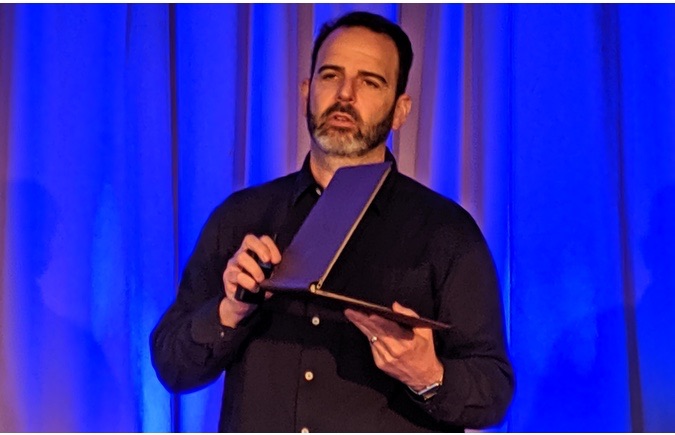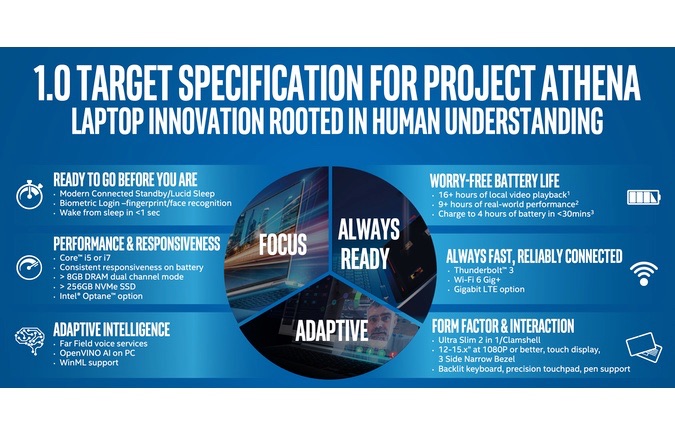Intel Project Athena: Specs, Potential Laptops and Why You Should Care
Update Aug 8: Intel will now let laptop makers use a "visual identifier" that says "Engineered for mobile performance" on laptops that meet the requirements for Project Athena (see specs section).
Intel thinks the people who are buying laptops — and the things they're buying laptops to do — are changing. And now it's outlining the specs the chip maker thinks will be required to meet those shifting needs.
It's all part of Project Athena, an initiative Intel first unveiled during CES in January as a way to redesign notebooks to better meet users' needs. Intel believes that a new class of mobile is emerging that want to turn to the same device for work and play, and that they're demanding more portable laptops that don't skimp on battery life or performance.
Intel's dropped hints about Project Athena previously. Just this month, the chip maker announced that it was opening partner labs where makers of laptops and components could collaborate on longer-lasting machines. But this week's Computex trade show is giving Intel a platform to really dive into explaining Project Athena and what kinds of notebooks it will produce for mobile users.
Who Project Athena is for
At the heart of Intel's Project Athena efforts is the idea that users are now turning to laptops to handle both work and side projects or personal passions — with the lines between those efforts becoming increasingly blurred. The way Intel sees it, an office worker who's completed a report on her work laptop doesn't want to switch to a new machine to edit the music project she's working on during her off-hours: she wants one machine that does everything.
"It's really our north star, understanding this new customer," said Josh Newman, vice president and general manager of the Mobile Innovation Segments for Intel's Client Computing Group.
Sign up to receive The Snapshot, a free special dispatch from Laptop Mag, in your inbox.
Laptops built under Project Athena guidelines are trying to address three user demands. They need to be designed to help users focus by waking up instantly and delivering responsive performance no matter the task. They need to adapt to users' needs, whether that's with ultra-portable form factors or AI-powered features. And they need to always be ready, offer reliable network connections and enough battery life so that users don't have fret about their laptop running out of power.
Intel stresses that Project Athena is a multiyear process, with the ultimate goal being to deliver notebooks that filter out distractions and immerse users in what they're doing. These laptops will keep users connected automatically and instantly, adapting to their needs as they're using the machine and offering more battery than a user can consume in a day. Laptops should also help users collaborate, keep data safe and double as a personal cinema.
"This is based on what customers need," Newman said. "And we believe these are the experiences that will delight them."
For 2019, though, Intel is focusing its efforts on creating a responsive laptop that's ready to go whenever you wake it up. It's also pushing for devices that deliver long battery life. And these aren't either/or goals, Newman noted: Intel wants to meet all three objectives at the same time.
Project Athena specs
To that end, Intel's now publicly spelling out target specs for Project Athena hardware. Working with other parts suppliers and laptop makers, Intel wants Project Athena devices to meet the following standards.
- Performance: Laptops will have a Core i5 or Core i7 processor augmented by more than 8GB of DRAM. The notebooks will provide at least 256GB of SSD storage, and Intel Optane memory, which prioritizes frequently used apps, will be available as an option.
- Battery: Intel's not kidding about worry-free battery life. It's targeting 16-plus hours of local video playback and 9-plus hours of wireless web browsing. Laptops should be able to deliver 4 hours of battery life after 30 minutes of charging.
- Ready to Go: Project Athena laptops should wake from sleep in less than a second with support for Connected Standby or Lucid Sleep features. The laptops will also offer biometric login through either fingerprint scanning or race recognition.
- Connectivity: Expect Thunderbolt 3 as well as Wi-Fi 6 Gig+ as standard connectivity features. Gigabit LTE will be an option as well.
- Adaptive Intelligence: Project Athena devices will support OpenVino, Intel's AI tools, as well as WinML. The laptops will support far-field voice services, too for voice-powered commands.
- Form Factors: Intel is focusing on ultraslim 2-in-1 and clamshell devices. It's pushing OEMs to deliver displays between 12 and 15 inches at 1080p resolution or better. Those will be touch displays with narrow bezels on three sides.
All told, Intel has 23 requirements for Project Athena hardware aimed at delivering the user experience the chip maker envisions. Intel will verify that notebooks are up to Project Athena standards with 15 responsiveness metrics and three battery life metrics. Intel will also test the battery's charge capabilities after 30 minutes and perform its Smart Sound technology test. When a laptop passes Intel's tests, it can receive an "Engineered for mobile performance" label that tells customers when a device meets this minimum set of requirements.
What to expect
Look for a dozen Project Athena models to debut this year, though Intel is leaving it up to the laptop makers themselves to announce when. The company is hoping to scale up the number of available devices in future years. However, the company's Computex keynote featured four upcoming laptops that meet Project Athena requirements: the Acer Swift 5, the Dell XPS 13 2-in-1, the HP Envy 13-inch Wood Series and the Lenovo Yoga S940.
For now, Newman said, the goal is for Intel and its hardware partners to raise the bar in responsiveness, battery life and instantaneous action with this year's devices. "Our mission this year is to convey how it's better inside," he said.


